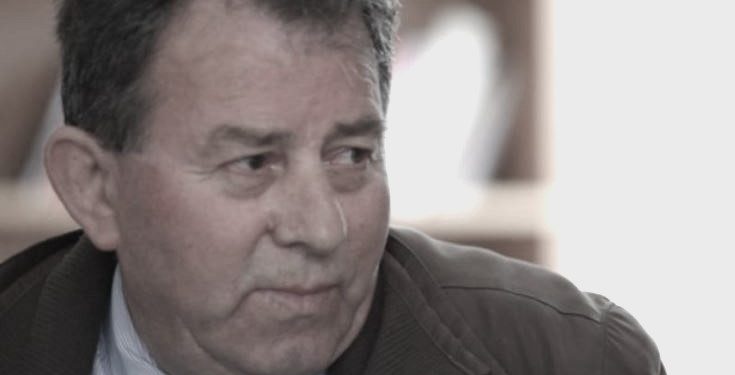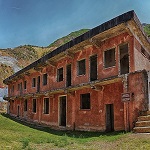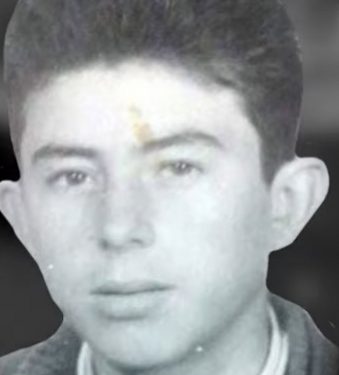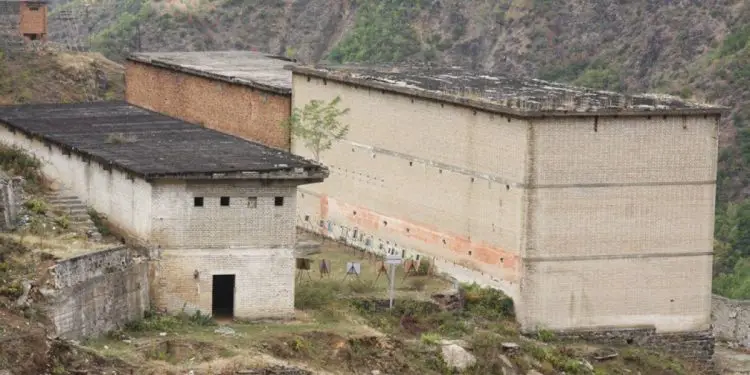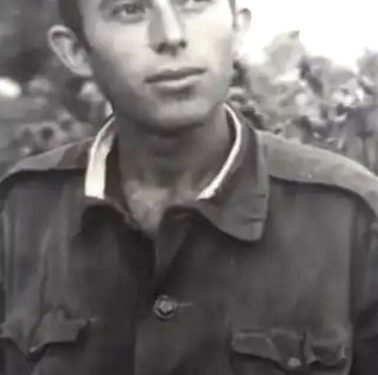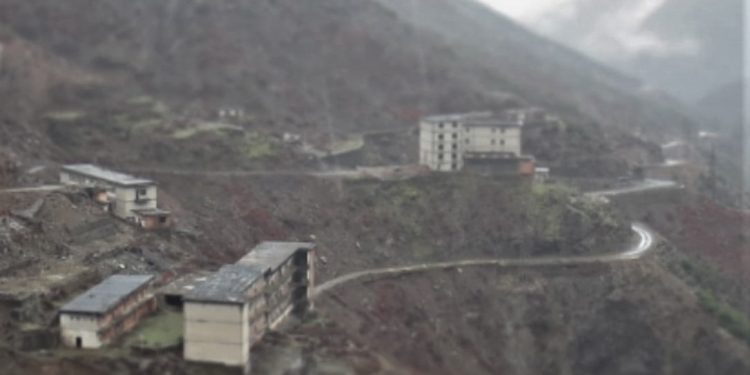By Shkëlqim Abazi
Part five
Memorie.al / I were born on 23.12.1951, in a black month of a time of mourning, under the blackest communist regime. On September 23, 1968, the sadistic chief investigator, Llambi Gegeni, the brutish investigator Shyqyri Çoku, and the cruel prosecutor, Thoma Tutulani, mutilated me at the Branch of Internal Affairs in Shkodër; they split my head, blinded one of my eyes, deafened one of my ears, after they broke several of my ribs, half of my molars, and the thumb of my left hand. On October 23, 1968, they took me to court, where the pathetic Faik Minarolli gave me a ten-year political prison sentence. After my sentence was halved because I was still a minor, a sixteen-year-old, on November 23, 1968, they took me to the Reps political camp, and from there, on September 23, 1970, to the Spaç camp, where on May 23, 1973, in the Revolt of the political prisoners, four martyrs were executed by firing squad: Pal Zefi, Skënder Daja, Hajri Pashaj, and Dervish Bejko.
On June 23, 2013, the Democratic Party lost the elections, a perfectly normal process in the democracy we claim to have. But on October 23, 2013, the Director General of the “Renaissance” government sent order No. 2203, dated 23.10.2013, for the termination of a police employee’s duty. Thus, Divine Providence became entangled with the neo-communist “Renaissance” Providence, and precisely on the 23rd, they replaced me, with nothing less than the former operative of the Burrel Prison State Security. What could be more telling than that?! The former political prisoner is replaced by the former persecutor!
The Author
SHKËLQIM ABAZI
Continued from last issue
REPSI
(The Forced Labor Camp)
Memoir
Six Hundred Grams
(The routine of a day at the sleeping camp)
Without realizing it, fatigue had defeated my mind and I had fallen into a deep sleep. I was haunted by frightening dreams of handcuffs, chains, interrogators, police, soldiers, border dogs, beatings, snakes, blood, shrieks, howls, ice, lightning, and thunder. I don’t know how long I had been sleeping, but I felt some sharp whistles that roared in my ears.
“Are they real snake hisses?! Have harpies or medusas taken over the prison territory? Or have all the buzzes of HELL come together?! And this shrill voice accompanying them with shouts: ‘Get up’!”
“Get up!”
I jumped up, startled. My swollen eyes wouldn’t open. I didn’t understand where I was. I blinked my eyes. I turned to the side to see if I could see Ladi or Luigji, but no! I was not in the cell! The whistles were real; the police were blowing their whistles with all their might; the shriek had been real, the camp herald was howling!
Oh God, how the people were swarming around me! Everyone was rushing, almost bumping into each other!
With towels thrown over their necks, with their gourds and bowls in their hands, they flew out the door as if they were possessed! They made some synchronized gestures, like marionettes moved by a hidden hand behind the scenes!
Oh God!
It took me a moment to come to my senses.
When I cleared my head, I threw my jacket over my shoulders and started to go down the wooden stairs, but from above, I heard the voice of Vaska asking me from beneath his rug:
“Where are you going?”
“The whistles are blowing!”
“So?”
“I’m hurrying to get out!”
“Take it easy, don’t rush, today you are a ‘six-hundred-grammer’!”
“They won’t say anything?”
“Lie down, man, until those who are going to work are done! It’s still night; you’ve got time until seven!”
I sat up on the bed, but physiological needs and curiosity wouldn’t leave me in peace. I went down the stairs a second time, stood on the doorstep, and looked at the hills around.
It was not yet fully light; you could barely make out the contours of the mountains. The sky above was clear; the last stars shone clearly in the firmament. A light, but razor-cold wind, pierced you to the bone.
The night must have been very frosty, because by the door, on some brittle rose branches like bird bones, delicate arabesques of ice hung, pure as teardrops. Even the ground of the yard looked frozen, and from the roofs below the first terrace, ice stalactites hung, long enough to reach the ground and as thick as an arm.
Brr-rrr-rr, I got the shivers. I tightened the thin jacket around my body, but the morning ice pierced the clothes and penetrated to my heart. My chin and teeth began to tremble, almost breaking each other.
Brr-rr-rr, so cold, I shivered again.
“Come on; get through all these years in these parts, my son!”
But I didn’t dwell on these thoughts; someone pushed me in the back and yelled in my face:
“Get in, you fool, move, you’re blocking the way!”
This hoarse voice brought me back to my senses.
I had unintentionally blocked the path of others who were rushing to take care of personal needs.
The sudden panorama had confused me; I had forgotten where I was going.
I muttered an “I’m sorry” and followed the crowd towards the bathrooms.
At the end of the yard, on the right side, a pair of worn steps dug directly into the ground went up a ridge. Swarms of prisoners were climbing and descending them.
A few meters above these stairs, a kind of shack stood, a little higher than a person’s height, which had some wrinkled eternit slabs for a roof, while the sides, about one meter high, were covered with some crooked, unhewn planks. At the back, they had tacked on some rusted sheet metal so that the barbed wire fence could not be seen.
I noticed that people there were hurrying with their heads down, with their pants almost at their feet. When it was my turn to go inside, I saw that this shack had been divided into six small cubicles, similar to pigsties, each not more than fifty centimeters wide and a little longer. They were separated from each other by a plank wall, lower than half a person’s height.
In each of these cubicles, they had laid two parallel planks at the very end, which served as footrests, so you wouldn’t slip into the pit. In this corner for intimate needs, there were no doors; consequently, everything was done out in the open, so much so that over time, the sense of privacy was forgotten. Below the structure, a pit was dug, one and a half meters deep, as long and wide as the shack itself.
Three hundred men deposited their excrement in this open pit. The putrid odors it spread stank across the territory, while the suffocating aroma of fresh human feces and urine could be smelled for kilometers.
The parallel planks that served as footrests would rot over time and, from the weight, would break. It happened that some unfortunate person would slip and sink into the filth, up to his throat. These horrific scenes for the one who suffered, for the soldier guards who were watching from a guard post no more than four meters away from the pit, would turn into comical sketches.
A few months after my arrival, I became an involuntary witness and protagonist of such a case. From the cubicle where I was relieving myself, I heard a muffled cracking sound, which was followed by a splash and then some groans. I jumped up suddenly without finishing; from above the wall, in the adjacent partition, I saw a hand scratching with its nails the viscous surface of the footrest plank.
I rushed over with my pants down around my feet, grabbed the hand by the wrist, and pulled with force. But I couldn’t lift him alone. Meanwhile, the heavy stench coming from the cesspit enveloped me, and my intestines gathered in my throat. A wave of vomit burst from my mouth and nose like a fountain. Dizziness drained my strength; I was almost paralyzed and nearly slipped into the pit myself.
The head, filthy to a pitiful extent, groaned from below the floor, a muffled sound that pierced my ears. Between gasps of vomit, I gathered my strength, tightened my grip on the hand that was about to slip, and shouted for help:
“Help! Help!”
Someone came next to me, but I didn’t register who it was. Together, we lifted the fouled body. I would learn later that my friend from Kavaja, Xhavit Murrizi, as soon as he heard my shout, had rushed over thinking that I was the one who had suffered the misfortune.
The moment the filthy body appeared on the surface, the soldier guard who had been following the macabre scene from the height of the tower burst out laughing and taunted us:
“Enemies, forward-march, dive headfirst! Come on, plunge in, it’s salty!”
When he saw that we didn’t respond, he continued:
“Hey, let the old fool learn to swim, either he’ll dive in or drown in the shit! The vile enemy!”
We didn’t reply; we had no time for his words.
We pulled out the unfortunate man. He was dripping with urine and feces all over, but we were just as covered as he was. The putrid aroma of human excrement poisoned the entire atmosphere. The old man shivered and mumbled something to him in an incomprehensible language.
We didn’t understand what he wanted to say, nor did we try to. We grabbed him by the arms and thighs and, almost slipping, went downhill towards the faucets. Behind us, on the ground beaten by thousands of feet, a trail of black streaks remained, like a fresh furrow. The smell of a decomposing corpse took over the camp space. Those who were walking by, with disgusted faces, covered their noses with their hands.
Upon arriving at the faucets, we tried to undress the poor man, to wash him with some buckets of water. But he, even though he stank all over, did not obey us; he resisted being undressed. It seemed he felt very ashamed, so he stammered half-words. Embarrassed, he thanked us and apologized for the trouble he had caused us.
From the specific accent that all minority members give to the Albanian language, I understood that he was a Greek-speaker. In the meantime, the incident became known throughout the camp; his two compatriots offered us help. They took the poor old man and put him in the shower, undressed him, washed him and rinsed him in a barrel with warm water.
After a few months, Barba Jorgji (Uncle Jorgji), as the old man was called, would pass away and be buried somewhere near the latrine pit. But let’s go back to the first day.
After waiting for a few minutes until it was my turn, I entered one of the free boxes and fixed my feet on the transverse planks, which were soaked with urine. I lowered my pants carefully. But when I lifted my head and saw dozens of others waiting on their feet in front of me, I felt ashamed.
This uncomfortable situation, unknown to me, made me lower my head, but the heavy, stinking fumes penetrated my throat. Vapors rose from the pit under my feet and created a kind of foggy curtain that the wind carried with it, spreading the ammonia emitted by the warm excrement of three hundred men into the atmosphere.
The suffocating aroma of feces and the vapors of urine caused a feeling of disgust that made my empty stomach nauseous. I lifted my eyes; my gaze met the looks of dozens of others. The feeling of shame multiplied, but when I noticed the careless indifference of those who were watching me, I continued a little more calmly.
The nonchalant attitudes gave me the message that here, nudity did not impress anyone; they simply came in, finished their business, and then, as if they were mechanisms, left completely indifferent.
These daily gestures in front of each other had stripped the individual of secrecy. It seems that living in a crowd had turned these people into an animalistic stage, just as I would also become accustomed to later. However, I got up, blushing, as if I had caused a public scandal. I pulled up my pants and left with my head down.
Now freed and relieved from physiological needs, I went down the filthy stairs to the yard, where groups of prisoners with basins and bowls were heading towards I don’t know where, to another shack, facing the yard.
The containers they held in their hands reminded me that I hadn’t eaten; I felt hungry. My guts, like chickens forgotten and locked in the coop, started clucking loudly. But I had to train my patience because I remembered that I had not yet been put on a work detail.
With my mouth watering, I returned to the shack door, where I went inside without delay. I climbed to my spot and began to contemplate at my leisure. Quick movements, frequent entries and exits. The workers, like robots, were performing several actions at once.
In the same fraction of time, some were slurping the thin soup directly from the basin or bowl and at the same time, putting on a wool sweater; some were kneading with one hand and with the other putting on their handmade sandals; some were stirring the food with a wooden spoon, while with a piece of cement sack paper, they were collecting the piece of bread they would take with them.
I was impressed by the quickness and simultaneity with which they performed these actions; all of them while in motion.
“My goodness, they have been automated! I wonder, does this await me too?”
Someone on the bed opposite me, in a hurry, took some blackened rags, twisted them around his ankle, fitted them masterfully so that he could walk freely with them even barefoot, and then put his feet into a pair of rubber sandals, made from worn-out tires.
Another one a little further away, threw a worn coat on his back, the color of which was indistinguishable, yet another one, a hair-stripped fur, someone a torn fur coat; but most had thrown a brown canvas jacket over their shoulders, which resembled an oilcloth.
This typical prison garment, impregnated with linseed oil, with a layer of paint on the surface, had become a skin, an umbrella, and a jacket for all the prisoners. A similar one would become my second skin for the next five years. After stuffing a white hat or a skull-cap over their heads, they rushed outside. While the prisoners who were going to work were performing these automatic actions, some arrogant thugs puffed up behind the police, hitting the corners of the shacks and howling and howling.
When I saw these lanky thugs who, with more zeal than the police themselves, urged their fellow prisoners to act even faster, I was disgusted.
“The police, fine, but what do these want? – I couldn’t help but speak. – And this scab, man, who raises his voice to the sky!” – the words had escaped me in a loud tone without my intention.
I felt a slight knock on my back. I turned my head; it was the priest who, with his finger on his lips, gestured for me to be silent and with a finger of his other hand signaled me to come closer.
I brought my head closer, and he whispered to me:
“Be quiet! You started badly!”
“But them?”
“They are the brigade leaders! Beware of them!”
“But aren’t they prisoners like us?” I asked in surprise.
“They are more evil than the corporals!”
“Really?!”
“Yes, a single word from them can cause you a disaster!”
I said no more; his tone left no room for doubt.
But it seems my words had caught the attention of a scab. He turned his head, gave me a stern look, but since he hadn’t heard clearly what I had said, he shook his head a couple of times and moved on, howling. Perhaps that head shake was meant to give me the message that my turn would come soon.
I memorized the dark face. I wouldn’t mistake it for a thousand other faces. I would soon confront this tar-souled man. The workers left for work. A few minutes later, the shack fell silent. Only the elderly and the sick remained inside.
The priest, who until then had been lying on the mattress, got up, put on his woolen knickerbockers and a vest, threw his jacket, also made of shajak, over his shoulders, and a towel around his neck, and went down the wooden stairs. I followed him. Now, it had dawned outside, but the wind was blowing at the same rhythm./Memorie.al
To be continued in the next issue




